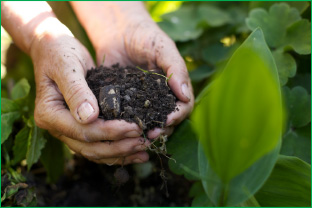Biosolid Programs Provide Solid Benefits to Our Partner Communities
 Biosolids are the nutrient-rich organic materials resulting from the treatment of domestic sewage in treatment facilities. For years we have encouraged the beneficial reuse of biosolids in a manner that protects human health and our environment. Across the Midwest, we help our community partners reap the many benefits that biosolids offer.
Biosolids are the nutrient-rich organic materials resulting from the treatment of domestic sewage in treatment facilities. For years we have encouraged the beneficial reuse of biosolids in a manner that protects human health and our environment. Across the Midwest, we help our community partners reap the many benefits that biosolids offer.
Recycling into the Cycle
When biosolids are applied to the land as fertilizer they improve and maintain productive soils and stimulate plant growth. The controlled application of biosolids to the land completes a natural cycle in the environment. Biosolids help plants resist drought and help provide micronutrients. When biosolids are used on cropland, rangeland and woodland they increase the retention and cycling of nutrients such as carbon, nitrogen, phosphorus, potassium, copper, zinc and lime. Biosolids provide a healthy environment for appropriate plant uptake of the necessary nutrients that crops need to grow. Soils treated with biosolids have shown to increase plant growth and crop yields. Biosolids have demonstrated the ability to bind to the soil which helps reduce erosion from wind and water, thus protecting air and water quality.
How Does the Process Work?
The four main methods of processing biosolids include digestion, thermal drying, solar drying and composting. Various wastewater treatment processes stabilize and disinfect the solids, destroying harmful bacteria and reducing odors. The result is a humus-like organic matter, dry powder, pellets, slurry or liquid that bear little resemblance to the untreated solids from which they were derived. Dallas Roggeman, our Lead Operator in Appleton, Minnesota, relays that they work with dried biosolids, while in other communities they work with liquids. “No matter the form, once a farmer sees the difference an applied biosolid makes to their soil and crops, he becomes our best advocate for the program,” he said. “The key is educating people about benefits and cost savings that are realized through the use of biosolids.”
Biosolids Are Safe, Effective and Good for the Environment
Biosolid recycling reduces both the amount of waste going to landfills and incinerators and lessens the use of petroleum-based chemical fertilizers being applied to fields. The application of biosolids must meet strict regulations and quality standards. In addition to accurate record keeping and reporting, state and federal rules govern the use and disposal of biosolids, set limits for contaminants and require pathogen and vector attraction reduction, site and crop harvesting restrictions. Our lead operator Colt Glidden puts it this way, “Biosolids have come a long way in past 30 to 40 years. What was once a landfill product is now recycled and returned to the community. This is an organic product, not a chemical – and that’s better for the soil and crops, and is vastly better for the health of our lakes and streams.”
We’d like to help you build a biosolids recycling program in your community. Contact us today to get started.


